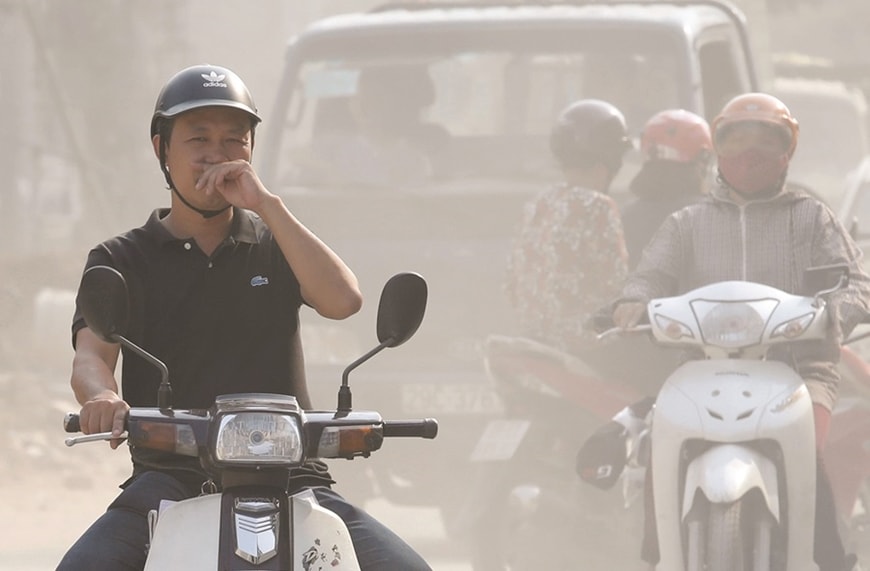The Ministry of Health recommends that kindergartens, nurseries, and primary schools may consider allowing students to stay home if the air quality index is at hazardous levels for three consecutive days.

Although air pollution occurs seasonally and is affected by climate and weather conditions, monitoring data from the Ministry of Natural Resources and Environment shows that air pollution has gradually increased, affecting human health and socio-economic development activities.
To proactively protect people's health from the harmful effects of air pollution, the Department of Health Environment Management (Ministry of Health) has developed recommendations to prevent the effects of air pollution on health to help people, especially those who are sensitive to air pollutants such as children, pregnant women, people with respiratory and cardiovascular diseases, and the elderly, have basic knowledge in implementing preventive measures and protecting health.
These recommendations are based on the Air Quality Index (AQI). Accordingly, when the AQI is at a poor level, it can affect health, especially sensitive groups, and outdoor activities should be reduced or limited to avoid exposure to air pollutants.
The Ministry of Health recommends that people regularly wear quality and properly-designed masks when leaving their homes. Regularly clean rooms and houses, and keep the living environment clean and airy. Masks and protective eyewear should be used when cleaning if there is a lot of dust or the air is polluted from poor to hazardous levels.
In particular, limit the use or replace the use of honeycomb coal stoves, firewood, and straw burning with electric stoves, induction cookers, or gas stoves. Planting trees helps prevent dust and clean the air.
Smokers should quit or limit smoking; do not smoke indoors. Non-smokers should stay away from secondhand smoke. People should also regularly monitor their health and have regular health check-ups.
People sensitive to air pollutants should avoid exposure to sources of air pollution emissions from vehicles; construction sites; cooking areas burning fuel such as coal, wood, straw or other areas at risk of air pollution.
During times of air pollution, if symptoms or acute illnesses such as fever, rhinopharyngitis, bronchial pneumonia, blood pressure, cardiovascular disease, etc. appear, you should immediately go to a medical facility for examination, consultation and treatment.
This group of people should also increase nutrition to improve their physical condition and resistance. They should pay attention to keeping their body warm in winter to avoid sudden colds.
People with respiratory and cardiovascular diseases need to comply with and maintain treatment as prescribed by a specialist. If there are signs of discomfort or worsening, they should immediately go to a specialized medical facility for examination, consultation and treatment. The elderly and people with respiratory and cardiovascular diseases need to comply with regular health check-ups.
The Ministry of Health also issued recommendations on preventive measures and health protection for air quality indexes at different levels.
When the air quality index is at a poor level (AQI 151 - 200)
Normal people should limit outdoor activities or participate in strenuous physical activities. If you have to work or do outdoor activities, you should arrange and choose a time of day with less pollution, need to rest more, and perform activities with moderate intensity. Avoid activities in areas with high risk of air pollution.
If you have to travel, you should increase the use of public transport and limit the use of motorbikes and bicycles to reduce exposure to polluted air.
Sensitive people should avoid outdoor activities or activities that require strenuous physical activity. Activities such as exercise and physical activity should be performed indoors. Limit opening windows and doors during times of heavy air pollution.
Clean your nose and gargle with saline solution morning and night, especially after going out. Rinse your eyes with saline solution in the evening before going to bed. Monitor your health. If you experience acute symptoms such as difficulty breathing, cough, or fever, go to a medical facility immediately for examination, advice, and treatment.
When the air quality index is very poor (AQI 201 - 300)
People should avoid prolonged outdoor activities or strenuous physical activities. Indoor activities are encouraged.
Avoid working in areas with high risk of air pollution. If you have to work in areas with high risk of pollution, you should use masks that can prevent fine dust.
If you have to travel, you should increase the use of public transport and limit the use of motorbikes and bicycles to reduce exposure to polluted air...
For sensitive people, avoid all outdoor activities, switch to indoor activities or move to another day when the air quality index is better. Limit opening windows and doors during times of heavy air pollution.
If you have to leave the house, you should minimize the time spent doing outdoor activities and use masks that can prevent fine dust.
When the air quality index is at hazardous levels (AQI 301–500)
Avoid outdoor activities, switch to indoor activities or move to another day when the air quality index is better.
For sensitive people, it is necessary to avoid all outdoor activities and switch to indoor activities. Monitor your health. If you experience acute symptoms such as difficulty breathing, cough, or fever, you should immediately go to a medical facility for examination, consultation, and treatment.
Kindergartens, nurseries and primary schools may consider suspending classes if the air quality index is at hazardous levels for three consecutive days. If attendance is mandatory, students should avoid outdoor activities, switch to indoor activities or adjust class times accordingly.
TB (summary)